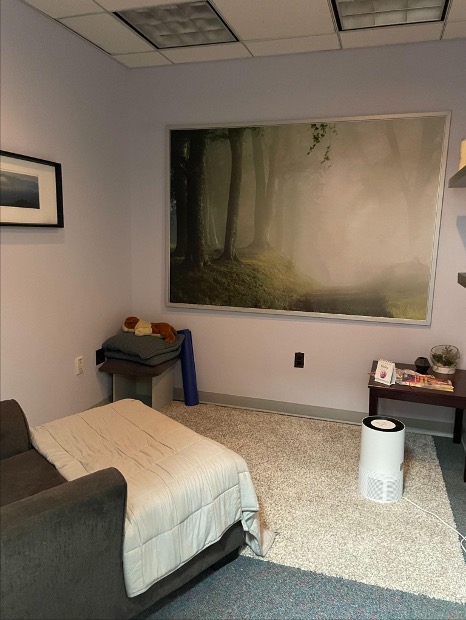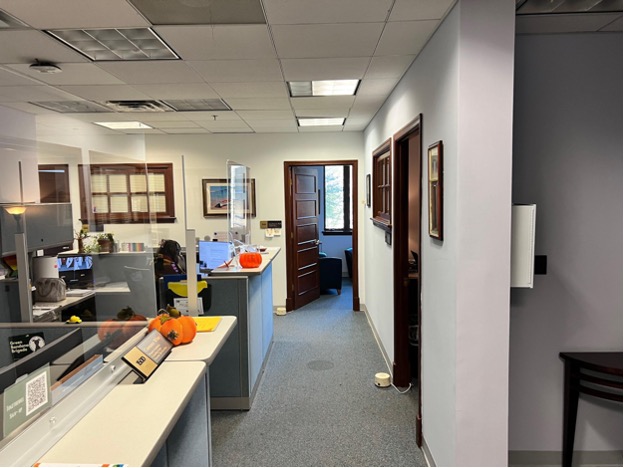The following does not represent the views of Loyola University Maryland, the Greyhound, or Loyola University’s Department of Communication.
I read with interest, dismay, and some hope Aidan Hunters’ opinion piece “Anti-War is Not Anti-Semitic.” I read with interest because I have a deep connection to Israel. Moreover, similarly to Aidan’s family, when my grandfather arrived in the United States, he changed his name to hide from the rampant anti-Semitism in America. I read with dismay because I found Hunter’s historical account of the conflict between Israel and Palestine at times incomplete, incorrect, misleading, and designed to cast the Israelis as inhuman oppressors and Palestinians as helpless victims.
I found some hope because we agree the only just path forward is for both sides to get rid of their current leadership and find a way to live in peace and security in countries of their own in which they are the majority. A two-state solution. For most of Israel’s 75-year history, Israel accepted the idea of the two-state solution. The Arab world, both the Palestinians and the Arab countries, largely did not.
As anyone who has read the Bible knows, Israel is the ancestral homeland of the Jewish people. Jews have continually lived in the area since at least 1000 B.C. When the Romans forcibly exiled most Jews from the region in 70 A.D., a small Jewish community remained, and the return to the land God promised Abraham became a central feature of Jewish religious practice. The Passover Seder, which celebrates the Jewish people’s liberation from slavery in Egypt, ends with the chant “Next year in Jerusalem.” The Jews are indigenous people to the region. The Al Aksa Mosque in Jerusalem, the third most holy site in the Islamic world, is built on the site of the second Jewish Temple. The Dome of the Rock next to Al Aksa is thought to be the place not only where Mohammed ascended to heaven, but where Abraham bound Isaac in the Book of Genesis.
With the rise of nationalism in Europe in the 19th century, Jews began to actively promote the ingathering of the exiles to the Holy Land to establish their own state. This movement was called Zionism. At the time, the region was ruled by the Ottoman Turks. And the Holy Land, called Filistin, was not organized as a single political or geographical unit but divided among several administrative districts.
After the Ottoman’s defeat in World War I, the French assumed control of what became Syria and Lebanon. The British controlled what became Israel/Palestine, Jordan and other Arabs lands. Not colonies, these were mandates of the League of Nations. The idea was they would ultimately become self-governing. Jordan was established in 1921; the Kingdom of Saudi Arabia in 1932. Lebanon in 1943 and Syria in 1946. The modern state of Egypt was established in 1953. Hunter’s assertion that since World War I all the Arabs have known is resistance is clearly wrong. All the modern Arab states were created in that period. His claim that the region was shaped by Western powers and Zionism is also misleading. The Arab countries made choices. They were far from powerless.
Israel/Palestine was complicated. There two peoples, Jews and Arabs, were fighting for national self-determination in the same geographical space. In the 1930s, the British determined that the national aspirations of the Jews and the Arabs were not compatible and recommended that the area be partitioned into two states. In 1947, the United Nations heeded that recommendation and created two states: one with a Jewish majority and one with an Arab majority. In 1948, Jews accepted a partition and established the State of Israel.
The Arabs did not. The surrounding Arab countries attacked the newly formed Jewish state. During the ensuing war the U.N. Conciliation Committee on Palestine estimated that around 700,000 Arabs fled or were driven out from the Jewish controlled areas and of that number, 250,000 to 300,000 fled before the state of Israel was declared. Nearly 900,000 Jews were expelled or fled from Arab countries in the backlash that followed the establishment of Israel.
This exchange of population was not unusual when British mandates came to an end and lands were partitioned. In 1948, the partition of India and Pakistan produced perhaps as many at 14 million refugees. Estimates of the number of people killed in the process range from 300,000 to well over one million.
The partition of the Indian subcontinent also didn’t go well, as witnessed by the ongoing violence in Kashmir until today. But there was a major difference. The refugees created by the India/Pakistan partition were absorbed into those countries in the same way that the Jewish refugees from Arab lands were absorbed into Israel. The Arab refugees from Palestine were not absorbed into Egypt or Jordan. They were placed in refugee camps administered by the U.N. in Gaza and the West Bank, the territories envisioned as the Palestinian state. They have remained in those refugee camps until now. These camps were not created by Israel. They were created by Arab countries, which refused the Palestinians citizenship.
From 1948 until 1967, Egypt and Jordan controlled the land meant to be Palestine. Why Egypt and Jordan did not set up a Palestinian state on their own is complicated. After the Six Day War in 1967, Israel once again took control of the West Bank and Gaza. In response, the Arab countries issued what was known as the “Three No’s of Khartoum,” no peace, no negotiations, no recognition of Israel.
Since 1948, at times peace between Israelis and Palestinians seemed possible. In 1951, the King of Jordan entered secret negotiations with the Israeli government to search for peace. He was assassinated. In 1977, the president of Egypt, Anwar Sadat, flew to Jerusalem to call for peace leading to the Camp David Accords, establishing peace between Egypt and Israel. In 1981, Sadat was assassinated. In 1994, Yitzchak Rabin, one of the greatest soldiers in modern Jewish history, signed the Oslo Accords with Yasir Arafat, of the Palestine Liberation Organization creating a roadmap to the creation of a Palestinian state. Rabin was assassinated by a Jewish extremist.
In the past 75 years, the Israelis have agreed to a two-state solution four times, in 1948, in 1994, in 2001 and in 2009. The Palestinians tentatively agreed to a two-state solution once, in 1994, which brings us to the current solution.
Hamas was established in 1987. At that time, the threat to the world posed by radicalized Islamists extremists expressed through the actions of Al Qaeda, the Taliban, ISIS and others was not yet understood. Israel tragically thought an Islamist movement would be less of a threat to its security than the nationalist Palestine Liberation Organization, even though Hamas’s charter called for the eradication of Israel and the genocide of the Jewish people. Israel was clearly horribly wrong in that judgment call.
In 2005, led by another fabled Israeli general Ariel Sharon, Israel unilaterally withdrew from Gaza. The hope was the Palestinians would set up a vibrant community that would eventually lead to a two-state solution.
That is not what happened. In 2006, Hamas won an election to represent Gaza in the Palestinian Authority. In 2007, Hamas expelled the Palestinian Authority from the Gaza entirely, murdering many of its representatives there. From that point, Hamas has ruled Gaza with an iron fist, not for the benefit of the Gazans but to serve as a base to attack Israel, the culmination of which took place on Oct. 7. If you doubt that Hamas was focused on destroying Israel and not helping Gazans, consider this: After the Oct. 7 attack, a Hamas leader was asked in a television interview why Hamas built hundreds of miles of underground tunnels to protect its fighters, and not one bomb shelter to protect Gazan civilians from the onslaught they knew Israel would launch when attacked. His reply? “It is not our job to protect civilians.”
Hunter talked about a friend of his and her bitter experiences living on the West Bank. It should not be that way. I would like to tell you about my friend Vivian Silver, who I met in the 1970s on a kibbutz in Israel and who I visited last summer. Vivian dedicated her life to trying to build Israel/Palestine as a shared space, where the rights, dignity and security of both Jews and Arabs are protected. In 1990, she moved to Kibbutz Beeri, less than two miles from the Gazan border. In 2005, after Israel evacuated Gaza, she began to work with Gazans on joint economic development projects. When Hamas took over in 2006, it halted all joint development and destroyed the infrastructure the Israelis had built and left behind. Hamas also refused to allow Gazans to benefit from development aid from the European Union.
With the gates to Gaza closed, in 2014 Vivian founded an organization called Women Wage Peace, which included Jewish and Arab women demanding an end to the conflict. When she retired, she set up an organization that arranged for Gazan children with cancer to receive care in world-class Israeli hospitals, often driving them there herself.
On Oct. 7, terrorists entered her apartment on Kibbutz Beeri.. At first, we thought she had been taken hostage because there was no sign of her in her home when the Israelis regained control. We prayed that since she was 74 years old, she might be among the first hostages to be released. But after five weeks of sifting through the ashes of her burnt house, investigators found enough of her DNA to determine that Vivian had been incinerated by the Hamas terrorists. Vivian is not the only person I know personally who has been killed or taken hostage. Vivian should not have died that way.
Since the beginning, there has been no shortage of pain in this conflict on both sides. Neither side has won the contest for who suffers more.
And while over the past 75 years, the Israeli government periodically has been willing to accept a two-state solution, the current government is not open to the idea. Sadly, the Netanyahu government has found a perfect partner in Hamas. The leadership of Hamas has already asserted that it wants more Oct. 7ths, as many as it takes to destroy Israel. That makes if very easy for the Netanyahu government to proclaim that there are no partners for peace, and its only option is to prevent the creation of a Palestinian state at all costs. Perhaps Netanyahu is right. Hamas never tried to relieve the suffering of its people and has never been open to negotiations for peace. But I am still hopeful that he is wrong.
Two points before the end. Hunter argued that Zionism has been “weaponized to create an inherent power imbalance in the region.” This is false. Zionism is the idea that the Jewish people, like every other people in the world, has a right to self-determination in their ancestral homeland. The Jewish people have as much right to a homeland in which they are a majority as any other people in the world. The scope of that territory has been hotly debated within the Jewish community since the return began nearly 130 years ago, but not the fundamental right of a country of our own.
Second, one of the people Hunter quoted argued that Israel is an apartheid state. That also is false. If Israel was to try to maintain control of the West Bank and Gaza forever and not grant the Palestinians their political rights, I would agree with that assertion. But that is not the case. Clearly, control of Gaza and the West Bank is still contested. As for Israel itself, while the same kind of disgraceful discrimination against Arabs exists there in the same way that discrimination exists in the United States, half of all medical professionals in Israel are from Arab and Druze communities, including 17 percent of doctors and 48 percent of pharmacists. Arabs account for 16 percent of university students. Arabs are represented in the Israeli parliament and an Arab Islamist party was in the previous government. While Israel, in my opinion, has a lot be ashamed for its treatment of its Arab citizens, it is not apartheid.
But even with all the animosity between the two communities, I am still hopeful. More than 2000 people attended my friend Vivian’s memorial service. They came from all communities and all walks of life: young, old, urban, rural, religious, secular, Israeli Arabs, Christian and Moslem and Druze. Even a friend from Gaza sent a message. They were bound together in mourning for their friend and in their dedication to her vision of a shared Israel/Palestine as a democratic, just region in which both communities have self-determination, security and peace. Her memorial service was a vision of what could be, Arabs and Israelis, Jews and Muslims and Christians, religious and secular, in harmony. A two-state solution. It is still not inconceivable or impossible.
And here is where Hunter and I agree. Both sides need new leadership to lead us to the promised land. I know that leadership exists in the Israeli community. I hope that it can be empowered. And I can only pray that it can be found in the Palestinian side as well. Vivian always argued that she found plenty of partners to work with among the Palestinians and Israeli Arabs. I honor her memory by keeping the faith that she was right.













































































































